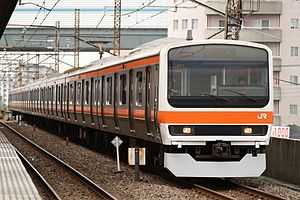Musashino (train)
| Musashino | |
|---|---|
|
A 209-500 series EMU on a Musashino service, August 2011 | |
| Overview | |
| Service type | Local |
| Locale | Kanto region, Japan |
| Predecessor | Rapid Shinkansen Relay |
| First service |
2001 (Rapid) 4 December 2010 (Local) |
| Current operator(s) | JR East |
| Route | |
| Start | Hachiōji/Fuchū-Hommachi |
| End | Ōmiya |
| Line used | Tōhoku Main Line, Musashino Line, Chūō Main Line |
| On-board services | |
| Class(es) | Standard class only |
| Seating arrangements | Longitudinal |
| Catering facilities | None |
| Other facilities | No toilets |
| Technical | |
| Rolling stock | 205/209-500 series EMUs |
| Track gauge | 1,067 mm (3 ft 6 in) |
| Electrification | 1,500 V DC overhead |
The Musashino (むさしの) is an all-stations train service in Japan operated by the East Japan Railway Company (JR East) between Hachiōji and Fuchū-Hommachi in Tokyo and Ōmiya in Saitama Prefecture.[1]
Service pattern
Services consist of two trains from Fuchū-Hommachi to Ōmiya in the morning, together with one return working from Ōmiya to Hachiōji and back. In the evening, there are two services from Ōmiya to Hachiōji, and one service from Hachiōji to Ōmiya.[2]
Routes
The trains to and from Hachiōji use two "shortcut" tracks normally used only by freight trains: one connects the Chūō Main Line (Kunitachi Station) and the Musashino Line (Shin-Kodaira Station) and the other connects the Musashino Line (Nishi-Urawa Station) and the Tōhoku Main Line (Yono Station).[3]
Rolling stock
Services are formed of Musashino Line 205 or 209-500 series 8-car EMUs with longitudinal seating throughout.[4]
-
A 205 series EMU on a Musashino rapid service, July 2011
-
Musashino Line 209-500 series
History

The Musashino was formed in 2001 following the renaming of the earlier Rapid Shinkansen Relay. From 1 December 2002, 6-car 115 series EMU formations based at Toyoda depot in Tokyo replaced the previous 165 and 169 series EMU formations.[5]
Rapid service pattern
Prior to the 4 December 2010 timetable revision, two return workings operated on weekdays, with one return Holiday Rapid Musashino working at weekends, as shown below.[6]
Weekdays
- Musashino 1: Fuchū-Hommachi (0734) → Ōmiya (0811)
- Musashino 2: Ōmiya (0853) → Hachiōji (0949)
- Musashino 3: Hachiōji (1643) → Ōmiya (1742)
- Musashino 4: Ōmiya (1847) → Hachiōji (1946)
Weekends/holidays
- Holiday Rapid Musashino: Hachiōji (0647) → Ōmiya (0733)
- Holiday Rapid Musashino: Ōmiya (1822) → Hachiōji (1914)
From the start of the revised timetable on 4 December 2010, the Musashino ceased to be a limited-stop "rapid" service, with trains stopping at all stations, and the number of daily services increased.[7]
See also
References
| Wikimedia Commons has media related to Musashino (train). |
- ↑ JR Timetable, February 2011 issue
- ↑ "JR北海道・JR東日本 2010(平成22)年12月4日ダイヤ改正レポート" [JR Hokkaido & JR East 2 Dec 2010 Timetable Revision Report]. Tetsudō Daiya Jōhō Magazine (Japan: Kōtsū Shimbun) 40 (321): p.82–83. January 2011.
- ↑ "行楽列車"ホリデー快速"と武蔵野線ジャンクション" ["Holiday Rapid" Excursion train and Musashino Line junctions]. Japan Railfan Magazine (Japan: Kōyūsha) (439): p.30. November 1997.
- ↑ "JR北海道・JR東日本 2010年12月4日ダイヤ改正概要" [JR Hokkaido & JR East 4 Dec 2010 Timetable Revision Overview]. Tetsudō Daiya Jōhō Magazine (Japan: Kōtsū Shimbun) 39 (319): p.81. November 2010.
- ↑ JR電車編成表 2010夏 [JR EMU Formations - Summer 2010]. Japan: JRR. May 2010. ISBN 978-4-330-14310-1.
- ↑ "臨時列車運転情報" [Seasonal Train Schedule Information]. Tetsudō Daiya Jōhō Magazine (Japan: Kōtsū Shimbun) 39 (318): p.94. October 2010.
- ↑ 2010年12月 ダイヤ改正について [Details of December 2010 Timetable Revision] (PDF) (Press release) (in Japanese). JR East. 24 September 2010. Retrieved 25 September 2010.
| ||||||||||||||||||||||||||||



.svg.png)